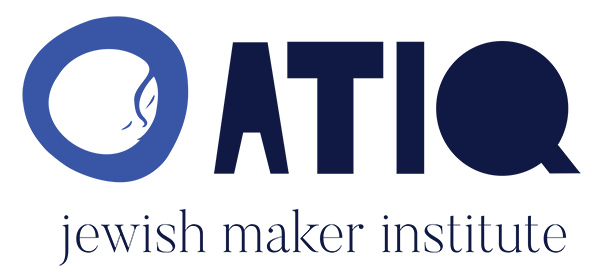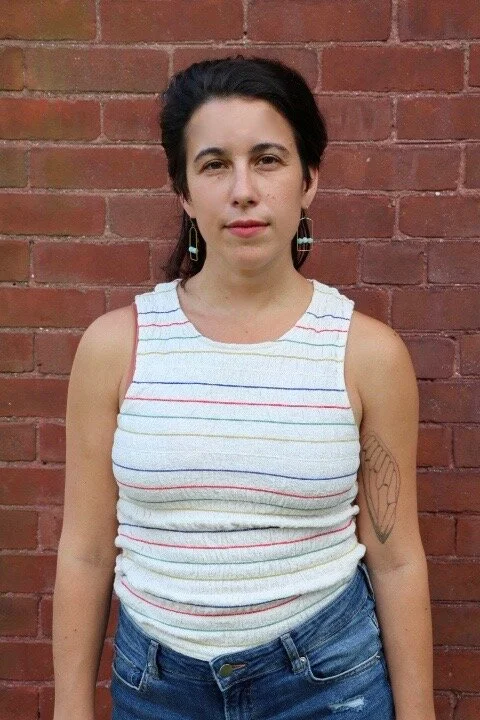Meet the alumni
We’re so excited to introduce you to our inaugural cohort of fellows - now our inaugural cohort of alumni - and to share some of the work they created during their time in the Maker Kollel in the Fall 5779/2019 session!
Arielle Tonkin,
SenioR Fellow
Arielle’s work focused on the notion of prayer with your hands, and asked the question, “How do I pray with objects?”and was an investigation into the relationship between transitional objects and ritual objects. Her project, which included a large oil painting and a collection of several symbolic objects, invited participants to reflect upon people in their lives that they wished to connect with for healing, and to engage in that process through the act of prayer through creating.
Anya Riddell Kaufman
Anya’s work involved a personal deep dive into the Kabbalistic Sefirot that we introduced fellows to as the armature that our work in the Kollel rested on. The Sefirot are 10 emanations referenced in Kabbala to describe God’s creation of the world, and we related to them more generally as a description of the creative process. Anya created a circular deck of Sefirot cards and corresponding booklets that invited participants to access each of these and consider the resonance in their own lives.
Ariel Wolgel
Ariel’s work asked the question: “How can Jewish rituals and wisdom inform our support of infertility and miscarriage?” Participants were invited to bear witness to the stories of four women, and through our presence, to ceremonially sit shiva with them (ritually grieve) and share notes of support. A circle of specially designed yartzeit (memorial) candles and a collection of evocative art objects created a sacred theater of reflection within which to actively consider the ways that we show support and can be supported through infertility and miscarriage within the Jewish community.
Nechama Shaina Langer
Nechama created a Sukkah wall that invites in the Ushpizot (the female or feminine spiritual guests), depicted through the placement of names on a feminine figure according to the traditional Kabbalistic Sefirot. Just as the Sukkah represents a sanctuary in the Divine presence, so too, our tradition tells us, our bodies are sanctuaries for the presence of God. In addition to giving participants the opportunity to reflect on which Ushpiza (singular of Ushpizot) they would like to embody or draw inspiration from this year, Nechama’s project was also intended to highlight the feminine taking ownership over sexuality, and how that can be holy, sacred, kadosh.
Maura Pellettieri
Maura’s project is called “The Book of Pleasure". It is an erasure poem formed by redacting words of liturgy that feel particularly difficult, usually because of their patriarchal resonance. The project was an investigation into how to be in sacred conversation with passages of text that can feel at times feel violent to our sensibilities.
Raizy Lichtenstein
Raizy’s work at the Maker Kollel was titled “Heilege Continuum: Weekdays and Shabbat”. Many people, Raizy noted, don’t feel a relationship to how sacredness is presented. The words sacred, holy, or even the Hebrew Kadosh carry a weightiness that can feel distancing. In contrast, Raizy pointed to the Yiddish word Heilig, which she described as a heimish (homey, ie hearth or home based) word for holiness. Along with a collection of other Yiddish words (Raizy’s mother toungue)Heilig is a term used in traditional songs to describe Shabbat in warm, loving idiom. Raizy embedded this collection of words within a collection of hand-crafted ritual objects used in preparations leading up to Shabbat (including a board for kneading Challah dough) and for ritually greeting Shabbat once it arrives (including a Challah board for displaying and cutting Challah on the Shabbat table). This pair of objects, and other accompanying materials is a tangible manifestation of the Heilege Continuum that we strive for - a week whose preparations lead lovingly and with focused intention to Shabbat, and a Shabbat that gives energy and integrity to the work of the week ahead.



















